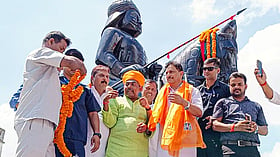Bihar SIR farce S2E1: ECI says no complaints received
National NationalPosted by AI on 2025-09-06 11:24:41 | Last Updated by AI on 2025-09-06 14:01:07
Share: Facebook | Twitter | Whatsapp | Linkedin Visits: 0

The Election Commission of India (ECI) has found itself in a pickle over the ongoing Bihar Students' Union Election (SIR) controversy as it faced public backlash for allegedly interfering with the electoral process and violating constitutional norms. The episode has raised questions about the independence and neutrality of the ECI.
The controversy began when the voting process for the Bihar SIR elections was halted midway on January 30, with allegations of irregularities and inflammatory messages circulated on social media. The ECI ordered an investigation and, in a surprising turn of events, claimed that no formal complaints had been received about the alleged irregularities.
However, in a classic case of shooting oneself in the foot, the ECI's statement inadvertently dilutes its own case, as the same statement revealed that the complaints filed were in the "wrong format." How did the Commission decide on the validity of the complaints if no complaints had been received? The statement appears to be a classic case of trying to save face without actually addressing the real issues.
The incident has led to intense scrutiny of the ECI's handling of the situation and whether its actions were warranted. The neutrality of the electoral process and the credibility of the Commission as a whole have been called into question.
Only time will tell how this episode will impact the ECI's reputation and the future of Indian elections.
Conclusion:
In this episode of the Bihar SIR farce, the ECI's attempt to clarify the situation has only raised more questions and uncertainty about what really happened and whether the electoral process is intact. The Commission is responsible for ensuring fair and independent elections, and it must demonstrate that it is upholding these principles at all times.
As the situation develops, it's crucial to analyze the entire episode and consider the broader implications it may have on India's electoral system and democratic norms. The public deserves a transparent and trustworthy election process, and it is the Commission's responsibility to ensure that trust is not compromised.
Only decisive and transparent actions can restore faith in the Commission and reinforce the integrity of India's democratic institutions.
Search
Categories
- Sports
- Business
- National
- Investments
- History
- Politics
- International
- Science & Technology
- Social Issues
- Disaster Management
- Current Affairs
- Events & Jobs
- మన పార్టీ
- మన నాయకత్వం
- మన విజయాలు
- డౌన్లోడ్స్
- మీడియా వనరులు
- కార్యకర్తలు
- రాజకీయం
- బిజినెస్
- సంపాదకీయం
- నవ్య
- చిత్ర జ్యోతి
- క్రీడలు
- జాతీయం
- తెలంగాణ
- తాజా వార్తలు
- Fast Check
- South
- Gallery
- Sunday Chronicle
- Hyderabad Chronicle
- Technology & Innovation
- Innovations and Initiatives
- బిజినెస్
- North East Skill Center News
- Government Schemes
- Entrepreneurship Support
- Employment Opportunities
- Skill Training Programs
- Education
- Startup Business
- Startup News
- Awards
- Community Services
- Fundraising Events
- Volunteer Services
- Health Initiatives
- సినిమా
- లైఫ్ స్టైల్
- క్రైం
- ట్రెండింగ్
- జాబ్స్
- అంతర్జాతీయo
- Market Buzz
- Banners
- Awards
- Partners
- Products
- Press Releases
- News
- Departments
- Initiatives
- Resources
- Telangana IT Parks
- Press Releases
- News
- Airport News
- Sports
- Business
- Newtons Laws of Motion
- Karbonn in Business
- Investments in Karbonn
- Company quarterly sales
- Markets
- Auto News
- Industry
- Money
- Advertisements
- Stock target
- Company Updates
- Stock Market
- Company Sales
- Staffing and HR
- Constituency Assembly
- General News
- Srikalahasti Temple
- Bojjala Sudhir Reddy
- Products
- Industries
- Services & Trainings
- Tools & Resources
- Technology Integration
- Drug Seizures & Arrests
- Telangana Narcotics
- Law & Enforcement
- Rehabilitation
- Nationwide Drug Policing
- Nigeria Seizures
- Global Operations
- Drug Awareness
- Drug Enforcement Tech
- NCB Drug Seizures
- Judicial Crackdown
- India's Surveillance Tools
- Cross-Border Links
- Women Safety
- Cyber Crimes
- Drug Abuse
- Traffic & Road Safety
- Community Connect
- Public Safety Alerts
- Citizen Assistance
- Nellore City News
- Politics & Administration
- Events & Festivals
- Agriculture & Rural
- Business & Economy
- Health & Wellness
Recent News
- Somasila Project's dilapidated canals need attention
- Trump's USA wooing India as Modi contemplates Russia military, energy deal
- Typhoon Peipah Causes Flood Damage & Blackouts In Japan's Kochi, Wakayama
- Sure! Here is a rewritten version of the provided description as a short and impactful news article with a headline of your choice in a concise and informative format.
- Kim Jong Un's Documentary Starring Xi and Putin
- The One Big Beautiful Bill Leaves Travelers With Heavier Wallet Load
- Emotions Run High as Fashion World Mourns the Loss of Giorgio Armani
- Arab Bloc Vows Action Over 'Hostile' Israel Actions, No Peace Without Palestine